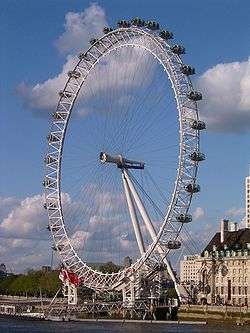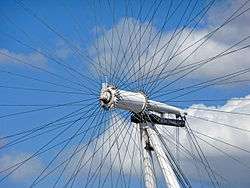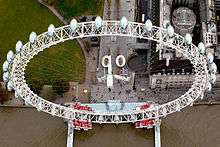London Eye
| London Eye | |
|---|---|
 | |
|
| |
| General information | |
| Status | Complete |
| Type | Ferris wheel |
| Location | London SE1, England |
| Coordinates | 51°30′12″N 0°07′10″W / 51.5033°N 0.1194°WCoordinates: 51°30′12″N 0°07′10″W / 51.5033°N 0.1194°W |
| Completed | March 2000[1] |
| Opened |
31 December 1999 (ceremonial, without passengers)[2] 1 February 2000 (first passengers carried) 9 March 2000 (opened to general public)[2] |
| Cost | £70 million[3] |
| Height | 135 metres (443 ft)[4] |
| Dimensions | |
| Diameter | 120 metres (394 ft)[4] |
| Design and construction | |
| Architect | Frank Anatole, Nic Bailey, Julia Barfield, Steve Chilton, Malcolm Cook, David Marks, Mark Sparrowhawk[5] |
| Architecture firm | Marks Barfield Architects[6] |
| Engineer | Arup[7] |
The London Eye is a giant Ferris wheel on the South Bank of the River Thames in London. Also known as the Millennium Wheel, it has also been called by its owners the British Airways London Eye, then the Merlin Entertainments London Eye, then the EDF Energy London Eye. Since mid-January 2015, it has been known as the Coca-Cola London Eye, following an agreement signed in September 2014.[8]
The structure is 443 feet (135 m) tall and the wheel has a diameter of 394 feet (120 m). When erected in 1999 it was the world's tallest Ferris wheel. Its height was surpassed by the 520 feet (158 m) tall Star of Nanchang in 2006, the 541 feet (165 m) tall Singapore Flyer in 2008, and the 550 feet (168 m) High Roller (Las Vegas) in 2014. Supported by an A-frame on one side only, unlike the taller Nanchang and Singapore wheels, the Eye is described by its operators as "the world's tallest cantilevered observation wheel".[9]
It is Europe's tallest Ferris wheel,[10] and offered the highest public viewing point in London[11] until it was superseded by the 804 feet (245 m) [12] observation deck on the 72nd floor of The Shard, which opened to the public on 1 February 2013.[13] It is the most popular paid tourist attraction in the United Kingdom with over 3.75 million visitors annually,[14] and has made many appearances in popular culture.
The London Eye adjoins the western end of Jubilee Gardens (previously the site of the former Dome of Discovery), on the South Bank of the River Thames between Westminster Bridge and Hungerford Bridge, in the London Borough of Lambeth.
History
Predecessor
A predecessor to the London Eye, the Great Wheel, was built for the Empire of India Exhibition at Earls Court and opened to the public on 17 July 1895.[15] Modelled on the original Chicago Ferris Wheel, it was 94 metres (308 ft) tall[16] and 82.3 metres (270 ft) in diameter.[17][18][19] It stayed in service until 1906, by which time its 40 cars (each with a capacity of 40 persons) had carried over 2.5 million passengers. The Great Wheel was demolished in 1907[20] following its last use at the Imperial Austrian Exhibition.[21]
Design and construction

The London Eye was designed by architects Frank Anatole, Nic Bailey, Steve Chilton, Malcolm Cook, Mark Sparrowhawk, and the husband-and-wife team of Julia Barfield and David Marks.[5][22]
Mace was responsible for construction management, with Hollandia as the main steelwork contractor and Tilbury Douglas as the civil contractor. Consulting engineers Tony Gee & Partners designed the foundation works while Beckett Rankine designed the marine works.[23]
Nathaniel Lichfield and Partners assisted The Tussauds Group in obtaining planning and listed building consent to alter the wall on the South Bank of the Thames. They also examined and reported on the implications of a Section 106 agreement attached to the original contract, and also prepared planning and listed building consent applications for the permanent retention of the attraction, which involved the co-ordination of an Environmental Statement and the production of a planning supporting statement detailing the reasons for its retention.[24]

The rim of the Eye is supported by tensioned steel cables[25] and resembles a huge spoked bicycle wheel. The lighting was redone with LED lighting from Color Kinetics in December 2006 to allow digital control of the lights as opposed to the manual replacement of gels over fluorescent tubes.[26]
The wheel was constructed in sections which were floated up the Thames on barges and assembled lying flat on piled platforms in the river. Once the wheel was complete it was lifted into an upright position by a strand jack system made by Enerpac.[27] It was first raised at 2 degrees per hour until it reached 65 degrees, then left in that position for a week while engineers prepared for the second phase of the lift. The project was European with major components coming from six countries: the steel was supplied from the UK and fabricated in The Netherlands by the Dutch company Hollandia, the cables came from Italy, the bearings came from Germany (FAG/Schaeffler Group), the spindle and hub were cast in the Czech Republic, the capsules were made by Poma in France (and the glass for these came from Italy), and the electrical components from the UK.[28]
Opening
The London Eye was formally opened by then Prime Minister Tony Blair on 31 December 1999, but did not open to the paying public until 9 March 2000 because of a capsule clutch problem.[2]
On 5 June 2008 it was announced that 30 million people had ridden the London Eye since it opened.[29]
Passenger capsules
 |
|
| Each of the 32 ovoidal capsules weighs 10 tonnes and can carry 25 people | |
The wheel's 32 sealed and air-conditioned ovoidal passenger capsules, designed[30] and supplied[31] by Poma, are attached to the external circumference of the wheel and rotated by electric motors. Each of the 10-tonne (11-short-ton)[32] capsules represents one of the London Boroughs,[25] and holds up to 25 people,[33] who are free to walk around inside the capsule, though seating is provided. The wheel rotates at 26 cm (10 in) per second (about 0.9 kph or 0.6 mph) so that one revolution takes about 30 minutes. It does not usually stop to take on passengers; the rotation rate is slow enough to allow passengers to walk on and off the moving capsules at ground level.[32] It is, however, stopped to allow disabled or elderly passengers time to embark and disembark safely.[34]
In 2009 the first stage of a £12.5 million capsule upgrade began. Each capsule was taken down and floated down the river to Tilbury Docks in Essex.[35]
On 2 June 2013 a passenger capsule was named the Coronation Capsule to mark the sixtieth anniversary of the coronation of Queen Elizabeth II.[36]
Ownership and branding


In 2006 Tussauds bought out the other two joint owners, British Airways and the Marks Barfield family (the lead architects),[14] and became sole owner. Ownership passed to Merlin Entertainments when it purchased Tussauds in 2007.
British Airways continued its brand association, but from the beginning of 2008 the name 'British Airways' was dropped from the logo.
On 12 August 2009 the London Eye saw another rebrand, this time being called "The Merlin Entertainments London Eye" to show Merlin Entertainments' ownership. A new logo was designed for the attraction—this time taking the form of an eye made out of London's famous landmarks. This coincided with the launch of Merlin Entertainments 4D Experience preflight show underneath the ticket centre in County Hall. The refurbished ticket hall and 4D cinema experience were designed by architect Kay Elliott working with Merlin Studios project designer Craig Sciba. Merlin Studios later appointed Simex-Iwerks as the 4D theatre hardware specialists. The film was written and directed by 3D director Julian Napier and 3D produced by Phil Streather.[37]
In January 2011, a lighting-up ceremony marked the start of a three-year deal between EDF Energy and Merlin Entertainments.[38][39] On 1 August 2014 the logo was reverted to the previous "The Merlin Entertainments London Eye" version, with the name becoming simply "The London Eye".
In September 2014, Coca-Cola signed an agreement to sponsor the London Eye for two years, starting from January 2015. On the day of the announcement, the London Eye was lit in red.[40]
Financial difficulties
On 20 May 2005, there were reports of a leaked letter showing that the South Bank Centre (SBC)—owners of part of the land on which the struts of the Eye are located—had served a notice to quit on the attraction along with a demand for an increase in rent from £64,000 per year to £2.5 million, which the operators rejected as unaffordable.[41]
On 25 May 2005, London mayor Ken Livingstone vowed that the landmark would remain in London. He also pledged that if the dispute was not resolved he would use his powers to ask the London Development Agency to issue a compulsory purchase order.[42] The land in question is a small part of the Jubilee Gardens, which was given to the SBC for £1 when the Greater London Council was broken up.
The South Bank Centre and the British Airways London Eye agreed on a 25-year lease on 8 February 2006 after a judicial review over the rent dispute. The lease agreement meant that the South Bank Centre, a publicly funded charity, would receive at least £500,000 a year from the attraction, the status of which is secured for the foreseeable future. Tussauds also announced the acquisition of the entire one-third interests of British Airways and the Marks Barfield family in the Eye as well as the outstanding debt to BA. These agreements gave Tussauds 100% ownership of the Eye and resolved the debt from the Eye's construction loan from British Airways, which stood at more than £150 million by mid-2005 and had been increasing at 25% per annum.[43]
Critical reception
Sir Richard Rogers, winner of the 2007 Pritzker Architecture Prize, wrote of the London Eye in a book about the project:
The Eye has done for London what the Eiffel Tower did for Paris, which is to give it a symbol and to let people climb above the city and look back down on it. Not just specialists or rich people, but everybody. That's the beauty of it: it is public and accessible, and it is in a great position at the heart of London.[44]
Writing for G2 in an article from August 2007, Steve Rose described the Eye as follows:
The Eye... exists in a category of its own.... It essentially has to fulfil only one function, and what a brilliantly inessential function it is: to lift people up from the ground, take them round a giant loop in the sky, then put them back down where they started. That is all it needs to do, and thankfully, that is all it does.[22]

Transport links
The nearest London Underground station is Waterloo, although Charing Cross, Embankment, and Westminster are also within easy walking distance.[45]
Connection with National Rail services is made at London Waterloo station and London Waterloo East station.
London River Services operated by Thames Clippers and City Cruises stop at the London Eye Pier.
References
- ↑ London Eye
- 1 2 3 London's big wheel birthday
- ↑ Reece, Damian (6 May 2001). "London Eye is turning at a loss". The Daily Telegraph.
- 1 2 "Structurae London Eye Millennium Wheel". web page. Nicolas Janberg ICS. 2011. Retrieved 5 December 2011.
- 1 2 "The London Eye". UK Attractions.com. 31 December 1999. Retrieved 7 January 2010.
- ↑ "About the London Eye". Retrieved January 2013. Check date values in:
|access-date=(help) - ↑ "Arup | Thoughts | How big can Ferris wheels get?". Thoughts.arup.com. 23 September 2013. Retrieved 21 May 2014.
- ↑ "CocaCola Great Britain Announce New Sponsorship Agreement For The London Eye". London Eye. Coca Cola London Eye. 16 September 2014. Retrieved 11 February 2015.
- ↑ Merlin Entertainments Group
- ↑ Royal Mail Celebrates 10 Years of the London Eye
- ↑ "Up you come, the view's amazing... first look from the Shard's public gallery". London Evening Standard. Retrieved 31 December 2014
- ↑ Shard observation deck to be Europe's highest
- ↑ The Shard Opens Viewing Deck To Visitors
- 1 2 "The London Eye a complete visitor guide". Retrieved 1 May 2014.
- ↑ The Ferris Wheel's London Rival
- ↑ Spot the difference: London landmarks, then and now
- ↑ Anderson Norman. Ferris Wheels:An illustrated history. p. 97. ISBN 087972532X.
- ↑ Richard Weingardt. Circles in the Sky: The Life and Times of George Ferris. p. 109. ISBN 0784410100.
- ↑ Richard Moreno. A Short History of Carson City. p. 74. ISBN 0874178363.
- ↑ The Great Wheel, London
- ↑ Anderson Norman. Ferris Wheels:An illustrated history. p. 100. ISBN 087972532X.
- 1 2 Rose, Steve (31 August 2007). "London Eye, love at first sight". Guardian. Retrieved 7 January 2010.
- ↑ Beckett Rankine – London Eye Pier Design
- ↑ "NLP – Project:". Nlpplanning.com. Retrieved 7 January 2010.
- 1 2 "Making of The London Eye". Londoneye.com. Retrieved 21 May 2014.
- ↑ "Color Kinetics Showcase London Eye". Colorkinetics.com. Retrieved 7 January 2010.
- ↑ Enerpac strand jacks lift London Eye. Enerpac.com. Retrieved on 6 February 2012.
- ↑ Mann, A. P.; Thompson, N.; Smits, M. (2001). "Building the British Airways London Eye". Proceedings of the ICE – Civil Engineering. 144 (2): 60–72. doi:10.1680/cien.2001.144.2.60.
- ↑ "All Eyes on Eighth Wonder: The London Eye greets 30 millionth visitor and joins Stonehenge and the Taj Mahal as a world wonder". web page. EDF Energy London Eye. June 2008. Retrieved 13 January 2012.
- ↑ Ashby, Charles. (15 November 2011) High-flying deal for Leitner-Poma. Gjsentinel.com. Retrieved on 6 February 2012.
- ↑ Colorado's Leitner-Poma to build cabins for huge observation wheel in Las Vegas. Denverpost.com. Retrieved on 6 February 2012.
- 1 2 "Interesting things you never knew about the London Eye". London Eye.
- ↑ Hester, Elliott (23 September 2007). "London's Eye in the sky not just a Ferris wheel". Chicago Tribune.
- ↑ "Disabled Guests". London Eye.
- ↑ Woodman, Peter (26 June 2009). "London Eye capsule taken away as refit starts". The Independent.
- ↑ "Queen lookalike unveils Coronation Capsule at London Eye". london-se1.co.uk. 2 June 2013. Retrieved 8 June 2013.
- ↑ "A new eye on London". London Eye.
- ↑ "EDF Energy naming rights". Attractions Management. Retrieved 8 January 2011.
- ↑ Merlin Entertainments, leading name in location based, family entertainment – MERLIN ANNOUNCES THREE-YEAR PARTNERSHIP FOR LONDON EYE WITH EDF ENERGY 070111. Merlinentertainments.biz (27 January 2011). Retrieved on 6 February 2012.
- ↑ "Coca-Cola to sponsor London Eye". Press Association. The Guardian. 16 September 2014. Retrieved 22 October 2014.
- ↑ "London Eye given eviction notice". BBC News. 20 May 2005. Retrieved 7 January 2010.
- ↑ "Mayor's 'prat' jibe over Eye row". BBC News. 25 May 2005. Retrieved 7 January 2010.
- ↑ Marriner, Cosima (11 November 2005). "BA sells stake in London Eye to Tussauds for £95m". The Guardian. Retrieved 7 January 2010.
- ↑ Marks Barfield Architects (2007). Eye: The story behind the London Eye. London: Black Dog Publishing.
- ↑ How to get here
External links
| Wikimedia Commons has media related to London Eye. |
| Preceded by Daikanransha |
World's tallest Ferris wheel 2000–2006 |
Succeeded by Star of Nanchang |
